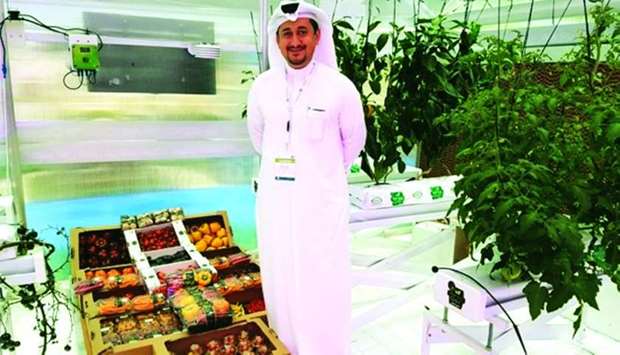“From day one, the private and government sectors have been working together to boost local production, and now, this is for the long term,” Agrico managing director Nasser Ahmed al-Khalaf told Gulf Times.
Agrico, a private local Qatari agricultural development company established in 2011 with the aim of helping the country achieve food security, operates a 120,000sqm (12 hectare) organic farm in Al Khor.
For the short term, al-Khalaf noted that the country is currently importing various food items “without any delay” from different sources such as Kuwait, Iran, Turkey, Oman, and India, among others with better quality and at reasonable prices.
“It is a very good opportunity to increase and concentrate on local production whether by producing vegetables, poultry, egg or dairy products, or meat, or even fish,” he added. “We are working on fish farming and also on improving the animal feed, but this is for the long term.”
He said the private sector, particularly local farm owners, and government authorities should hold several meetings “to see what has to be done for Qatar to have sufficient production both for the long term and short term.”
While the current local production is about 15% of the local consumption, al-Khalaf expressed optimism that Qatar can achieve self-sufficiency within the next three to five years due to the close co-operation between the private and public sector to increase production.
“By that time we can have a full production and we can even start exporting all types of food,” he said “Once you have fresh items, later you can have industries that can come after that.”
“If you have fresh milk for example, then you can start making cheese and yogurt, and other products,” the local farm owner explained.” Once you completed the full cycle, later on you can start to have categories, whether dairy products, canned or processed vegetables.”
In agriculture, he pointed out that production can be done all year long and can yield high quality products, which can be sold at lower prices such as egg and milk.
“That is why this is a good opportunity to bring the country’s economy up,” he stressed.
Agrico, for its part, has been talking to other farms, as well as house owners, on how to further increase production, according to al-Khalaf. He added that many people want to produce some vegetables for their own and friends’ consumption.
He said many farms in Qatar, including Agrico, have already plans to further expand their operations to meet the growing demand in the country.
“I guarantee you that every Qatari is feeling the same and they are moving ahead the same way,” he noted.
Storing raw items is the key
Agrico managing director Nasser Ahmed al-Khalaf finds it necessary to import some raw items, and should be stored in a “strategic storing facility.”
“If we can store raw rice, raw wheat, edible oil, sugar, and soya bean, among others, we can make downstream food stuff from them,” he explained by observing that “these are the items which we cannot grow locally.
Al-Khalaf said it would be very hard to have a sufficient production of rice, for example, since it will need vast areas of land and plenty of water.
Since production is not feasible, he noted that it would be cheaper for the country to import (off season import) and store it for a certain period, for example, five years using modern technology.


